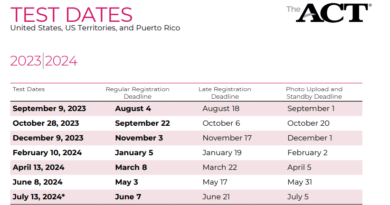What Do Colleges Look for in Admissions?
Wondering what college admissions officers look for in applicants and why SAT or ACT scores still matter? Feeling uncertain about how your own qualifications stack up against other applicants at your dream schools?
You’re not alone. College admissions can feel confusing and overwhelming. This guide will walk you through what colleges seek in prospective students and how you can make your application stand out. Here’s what we’ll cover:
- What colleges look for in applicants
- Why SAT and ACT test scores are valuable
- How understanding these criteria can boost your own college admissions process
Let’s dive into the specifics.
What Do Colleges Look for in Applicants?
Colleges are on the hunt for students who will thrive in their academic environment and contribute meaningfully to the campus community. While academic performance is central, admissions officers are also looking for unique, well-rounded applicants who bring diverse perspectives and passions to campus. Here are some of the key factors colleges weigh when reviewing applications:
1. Academic Excellence in College Admissions
- GPA & Transcript: Your GPA shows colleges how well you’ve performed academically. Colleges want to see that you’ve challenged yourself by taking advanced courses and that you’ve excelled in them.
- Course Selection: Admissions officers pay attention to the types of classes you’ve taken. If your high school offers AP, IB, or honors courses, colleges expect competitive applicants to enroll in these courses. For instance, Ivy League schools often prefer applicants who have taken AP or IB courses, even if it means a slightly lower GPA, as it reflects a willingness to tackle challenging material.
Example: Suppose your school offers AP Calculus, AP English, and AP Chemistry. Admissions officers would rather see you take these advanced courses (even if you get a B) than an easy A in regular classes. This shows you are serious about learning and prepared for college-level work.
2. Standardized Test Scores (SAT/ACT) in College Admissions
Even as more schools adopt test-optional policies, standardized tests still play a role in admissions. SAT/ACT scores provide colleges with a common metric to compare students from various educational backgrounds. A high SAT/ACT score can affirm your GPA and academic readiness, making you a more competitive applicant.
Example: If you have a 3.8 GPA but attend a less competitive high school, a high SAT/ACT score demonstrates that you’re ready for college-level rigor. At competitive schools, aim for a score that falls at or above the 75th percentile of admitted students for that college (e.g., a 34+ on the ACT or a 1520+ on the SAT for top-tier schools).
- Some schools, such as the University of California system, have moved to a test-blind model, meaning they don’t consider SAT/ACT scores at all. However, most other schools use them, even if optional, as another data point in evaluating your application.
Use USCanadaColleges.com to see what are acceptance rate, SAT, ACT Percentile and GPA requirements of your target colleges. The data of all US Colleges is available here.
3. Class Rank
Class rank compares your academic performance to your peers’. Many top-tier universities prefer applicants who are in the top 10% of their class, as it demonstrates both consistency and competitiveness. Some state schools, such as the University of Texas, guarantee admission to students in the top percentage of their graduating class.
Example: At a Texas high school, being in the top 6% of your class guarantees admission to the University of Texas at Austin. If you’re targeting Ivy League schools or other top institutions, being within the top 10% will make your application stronger.
Additional College Admissions Factors
4. Extracurricular Involvement and Leadership
Beyond academics, colleges want students who contribute to the community. Extracurriculars reveal your interests, commitment, and leadership potential. They also reflect how you might add value to the campus community.
Example: A student passionate about journalism might serve as the editor of their high school newspaper, win writing awards, and even intern at a local newspaper. Another student interested in environmental science could lead a recycling initiative at school, volunteer at local cleanups, and complete a related science fair project. Both examples highlight depth in a particular field, which top colleges value.
- Leadership roles: Holding leadership positions, such as club president or team captain, shows that you can motivate and organize peers. Top schools value depth over breadth, so it’s better to commit deeply to a few meaningful activities than to spread yourself thin.
5. Letters of Recommendation
Letters of recommendation provide an outside perspective on your abilities, character, and potential for success. Teachers or mentors can highlight qualities that may not come across in grades or test scores, such as resilience, teamwork, or enthusiasm for learning.
Example: If you’re applying to a STEM-focused program, a recommendation from your science teacher discussing your curiosity and dedication in advanced courses can strengthen your application. Or, if you’re known for community service, a recommendation from a volunteer coordinator could emphasize your impact and commitment to helping others.
6. Personal Essay
The personal essay offers a glimpse into who you are, your aspirations, and how you might contribute to the college. A strong essay can differentiate you from other applicants with similar grades and scores. Use this as an opportunity to showcase your personality, values, and voice.
Example: One student might write about how overcoming language barriers as an immigrant taught them resilience, while another might share how their passion for painting led them to start a nonprofit offering free art classes for underprivileged kids. These personal stories help admissions officers understand your journey and what you’ll bring to their community.
The Role of SAT/ACT Scores in College Admissions
While some schools are test-optional, SAT/ACT scores still serve important purposes:
Reason #1: Comparison Among Applicants
SAT/ACT scores allow colleges to compare students across different high schools with varying standards. A high score validates your GPA and shows that your academic performance is comparable to students from other regions.
Example: A student from a rural school with a 4.0 GPA and a 1500 SAT score shows they’re academically ready, despite possibly fewer advanced courses offered at their high school.
Reason #2: Institutional Reputation
Colleges are partly judged by the SAT/ACT scores of admitted students. Higher scores among admitted students often help colleges climb rankings, such as those published by U.S. News & World Report.
Example: Top schools like Stanford or Princeton aim to admit students with SAT scores well above the national average. This enhances their rankings and overall reputation.
Setting an SAT/ACT Score Goal
To increase your chances of acceptance, set a target score at or above the 75th percentile of admitted students for your desired college.
- Research percentile scores: Check your college’s 25th/75th percentile SAT/ACT range using Uscanadacolleges.com or similar resources.
- Prepare to excel: Aim high to stand out. If Emory’s 75th percentile SAT score is 1520, make that your target to give yourself the best chance.
- Use USCanadaColleges.com to see what are acceptance rate, SAT, ACT Percentile and GPA requirements of your target colleges.
Conclusion
The college admissions process is multifaceted. SAT/ACT scores, GPA, course rigor, extracurriculars, recommendations, essays, and more all play a role in how colleges evaluate applicants. A strong application highlights your academic readiness and how you’ll enrich the campus community.
By setting high academic goals, engaging meaningfully in extracurriculars, and ensuring a complete, polished application, you can present yourself as a strong candidate for your dream college. And remember, while SAT/ACT scores are important, they’re just one piece of your application.



